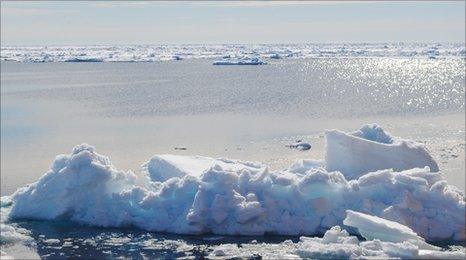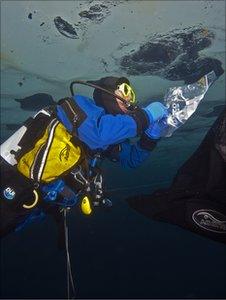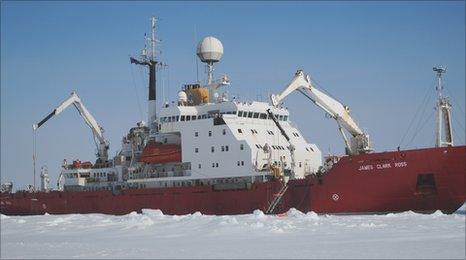Feeling the heat: Unlocking the Arctic's frozen secrets
- Published
Forecasts suggest that this year will see the amount of sea ice in the Arctic retreat to one of the lowest extents since satellite records began. So what will be the impact of an Arctic devoid of sea-ice during the summer in the future? Science writer Richard Hollingham has joined a scientific expedition trying to find out.

Arctic sea-ice extent during recent summers has been on a downward trend
"It's incredibly cold!" to paraphrase the words of Heiko Moossen as he emerged from a dive hole in the ice.
"As I went in my whole face was burning because it was so cold."
Mr Moosen, from the University of Glasgow, was diving under the ice to catch clumps of algae in a plastic bag.
"It was really hard because as you breathe out, the bubbles travel along the bottom of the ice and disturb the algae," he explained.

Scientists are keen to track the impact of declining summer sea-ice
That there is any plant life at all, a metre beneath the Arctic sea ice at 80 degrees North, is in itself remarkable. "It looks like an inverted landscape with hills and valleys but with quite a lot of light coming through the ice," he added.
The landscape above is every bit as beautiful: in the sunshine glistening ice floes stretch in every direction, separated by jagged ridges of ice and leads of gently rippling water.
Birds - including the almost perfectly white ivory gull - circle overhead, seals flop by the ice edge and, every day or so, a polar bear wanders by.
"I think it's very, very beautiful and a very unusual place to be," said expedition leader Ray Leakey from the Scottish Association for Marine Science (SAMS).
"It's also fascinating scientifically because we know so little about it. Few expeditions come here so we're among the first people."
Locked in the ice
Even getting this far North - we are currently around 1,000km from the Pole - has been a challenge.
Our ship, the James Clark Ross operated by the British Antarctic Survey, is specially designed for the Polar regions.
It has an ice strengthened hull and the ability to roll from side to side to break through or, if necessary, escape from the ice.
To reach this far we had to crunch our way through ice floes until we were completely surrounded. The ship is now moored up against a sheet of ice around half-a-kilometre wide and less than a metre thick.
Diving is only one aspect of the work that's been going on here. The ice floe is dotted with experimental stations designed to investigate the biology, chemistry and physics of the ice.
The Polar regions act as thermostats for the planet, regulating its temperature. The ice helps drive ocean currents and cools the Earth by reflecting heat back into space.
A team led by Ronnie Glud, also from the Scottish Association for Marine Science, has recently discovered another effect.
"The sea ice acts as a giant gas pump," Professor Glud explained. "It pumps carbon dioxide from the atmosphere into the deep ocean - and it's on a large scale."
He said his research was initially treated with scepticism but is now widely accepted. "It's a new insight we're gaining into this and the implications have astonished and surprised us."
The implication being that as the ice cover recedes, this pump will shut down and with it an important mechanism for removing carbon dioxide from the atmosphere.
Adapt or die
The plants and animals that live here are also at risk if the ice disappears, from microscopic creatures living in brine channels within the ice to the bears that roam across it.
Many of the species that live here are unique and if this lid on the top of the world disappears, Dr Leakey warned that as well as the effect on the climate, the whole biology of the Arctic could change.
"You will get an easier flow of ocean currents between the Pacific and Atlantic and the possible transfer of organisms between the two," he suggested.
"As the area warms up, you'll also get more and more organisms trying to get into the Arctic - some will be successful and some won't but for the organisms living up here at the moment, it'll be a case of adapt or die."
The symbol for the changing Arctic is the polar bear. In the nine days we've been moored against the ice, we've seen eleven bears.
They amble across the landscape in a smooth - almost rippling - movement, leaving no doubt who's in charge.
Cream, rather than white in colour, they head towards the ship at no great speed. Twice they've tried to chew through our mooring lines and one tore open a metal box which had, a few days earlier, contained a couple of chocolate bars. A sobering illustration of their sense of smell - a bunch of scientists would be easy prey.
"Bears are great to look at but when you're trying to do serious science on the ice they are a bit of a nuisance," said Dr Leakey.
Whenever anyone's working out on the ice, two look-outs are posted on the top deck to keep an eye on the bears.
As an added precaution, each landing team carries flares and a gun, only to be used as a last resort.
"If a bear appears, we clear the ice; the last thing we want to do is lose one of our scientists," Dr Leakey explained.

Few vessels are designed to cope with the harsh Arctic conditions
An Arctic free of sea-ice in future summers is a very real possibility, studies have suggested.
But there's much more at stake than polar bears. It would affect the entire food chain from the microbes in the ice and the algae beneath, to the fish, seals and, yes, bears.
Without ice, the Earth's ability to regulate its temperature would be reduced; the sea ice pump, identified by Professor Glud and his team, will switch off; and perhaps the ocean currents will change.
Other changes may be more positive: increases in fish stocks, new trade routes across the top of the world and the opportunity to exploit mineral resources.
As I look out of my porthole, blocks of ice are crushed against the side of the ship. As they topple into the water they reveal a myriad of colours. A jigsaw of floes, ice blocks and water channels blends into the mist.
Scientists are only now beginning to understand the Arctic, to uncover its secrets. There is a lot more to this place than just ice.
Richard Hollingham, a freelance science writer and broadcaster, is the presenter of this week's One Planet
One Planet is broadcast on the BBC World Service. Listen again